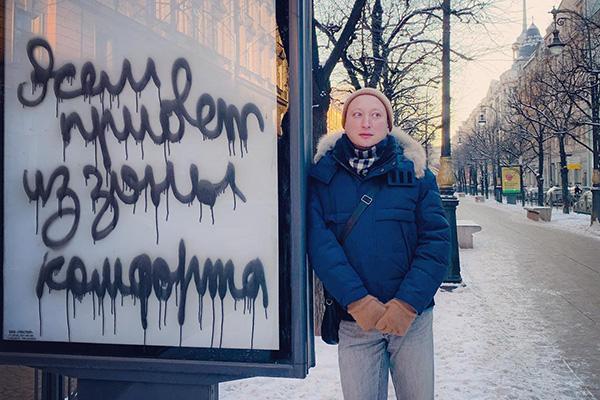Welcome, Ivan Savvine!

Interviewed by Sophie Papp, CSEEES Academic Year 2023-24 Intern
Ivan Savvine is the new Russian Instructor at Columbus International High School. Since August 2011, CSEEES has collaborated with the school to offer Russian language instruction to its students as part of our mission as a designated Department of Education Title VI National Resource Center (NRC). Welcome to the team, Ivan!
Why did you decide to start teaching Russian in the USA?
From 2000 to 2004, I formally studied linguistics and translation in Russia. Having moved to the USA in 2004, I continued my education in the field of art history. After receiving a master’s degree in art history, I worked in that field for a few years, but unfortunately, it was difficult to find consistent work. In 2014 I was offered a teaching position at the private night school “Fluent City” in New York. I very much enjoyed working there, and the students also enjoyed my classes. At the same time, I started working as a private teacher/tutor with students who were studying Russian language and literature, and for a few years I had a fairly successful private teaching practice. In 2018-2019 I took a few online courses on teaching Russian as a foreign language, and in 2020 I returned to Russia to begin my studies in a master’s program for instructors of Russian language at the Pushkin State Russian Language Institute in Moscow.
You moved to Columbus from New York City, where you’d already lived and taught for a few years. Why did you decide to move specifically here?
Because I had to leave Russia in September 2022, I’ve traveled quite a bit in the past few years. I lived in Europe for a bit, but I returned to the USA last summer to teach intensive Russian courses at Lewis University in Illinois and Concordia College in Minnesota. This year I’m also teaching in two online STARTALK programs, which would be very difficult to do from abroad because of the time differences. When I was offered the position at Columbus International High School, I was very happy to accept it. My work schedule here allows me to teach both in online programs and in person with students. I’m still not quite familiar with this city, but so far I’ve very much enjoyed The Ohio State University’s campus and the Columbus Museum of Art. Most importantly, I’ve already connected with many wonderful people from the Department of Slavic and East European Languages and Cultures, and I’m very happy to be working together with them!
You now teach both online and in person at Columbus International High School. Do you prefer one method of teaching to the other? If so, why?
It goes without saying that teaching online has its benefits: first, you don’t need to go anywhere and can work from the comfort of your own home; second, you can work with students regardless of where they’re physically located – for example, I’m currently working with students from New York, Florida, Illinois, and California. However, working online with, say, children, is truly difficult. I’ve only been teaching at Columbus International High School for a week, and I’ve already gotten to know my students – they’re wonderful kids who work very long and very hard in order to get a good education, regardless of any obstacles. I very much hope to be able to help them on their journeys.
Many schools in the USA teach romance languages, but not Russian. Why do you think this is?
People traditionally think of Russian as a very difficult language, which is true! Also, in my opinion, students and their parents don’t always understand the value of studying Russian language and culture and how such knowledge will be useful in the future. It is exactly because of this that it is imperative to clear up these misconceptions in schools, because knowledge of Russian language and culture (especially right now) opens up a sizeable amount of career opportunities, and also opens up a person’s inner world.
You also work as a translator. What kinds of materials do you prefer to translate, and why?
I currently don’t do translations very often because of the amount of language instruction I do online and in person. However, if I have time and if a project genuinely interests me, I will always be happy to take it on. For example, I recently translated a catalogue for an exhibition of Romanov family jewelry that was set to take place in London. It was a very interesting project, but unfortunately the exhibition was cancelled due to war, sanctions, and so on.
What advice would you give to people who want a career like yours – working with Russian language, but not working for the government or within academia?
Within government spheres, there is currently great demand for employees who can speak Russian. But along with this, it’s important to understand that much of this work is daily analysis and translation of Russian-language texts from government institutions (which to me, for example, doesn’t sound very interesting). I’m interested in academic work, and I hope to be accepted into a PhD program in the next few years – I was accepted to a PhD program in Moscow, but because of the events of the past two years, this opportunity essentially does not exist anymore. For me personally, the most important thing is to find meaning in the work that I do, and I think that my teaching work brings something new, important, and needed into the lives of my students.
